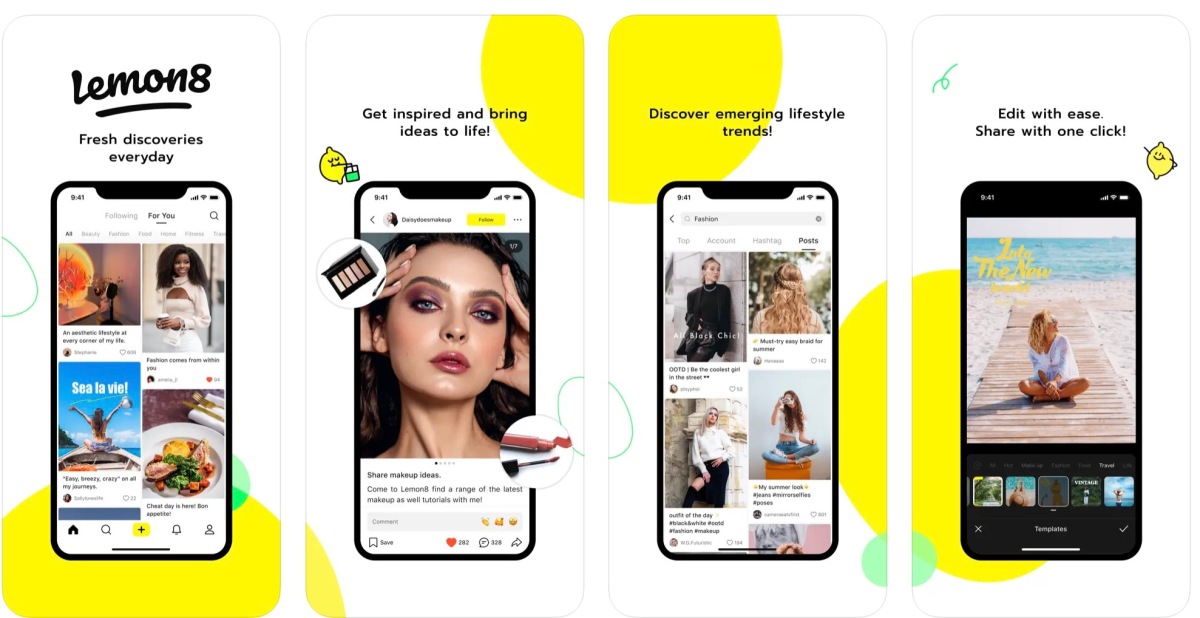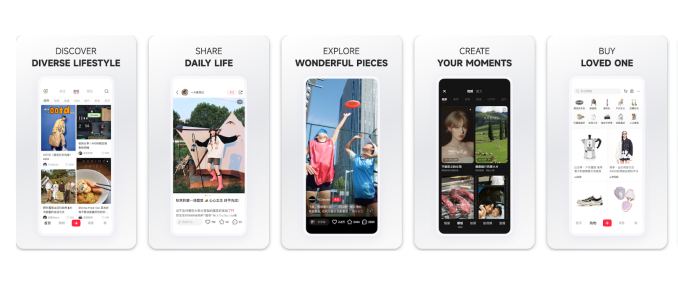SOCIAL
With latest hit Lemon8, ByteDance again learns from the China playbook

The app strikes a great resemblance to Xiaohongshu, a Chinese social media platform with 260M MAUs
Amid a wave of heated debate over whether TikTok should be banned, another ByteDance product, Lemon8, has popped up and quickly climbed into the top 10 on America’s app stores.
Lemon8’s sudden rise is reminiscent of TikTok’s early-day growth. At the time Vine had already pioneered short video sharing in the U.S., but TikTok took the media format to the next level through its content recommendation algorithms, a system that had proven immensely successful in China for its sister app, Douyin.
Some industry observers are now describing Lemon8 as something at the crossroad of Instagram, Pinterest and Amazon, but those familiar with the Chinese internet ecosystem would immediately recognize that the app is an instance of “copy-from-China”.
For much of China’s early internet history, entrepreneurs found inspiration in trends with strong momentum in the U.S. and build something comparable in China, giving rise to the country’s answers to Google, Facebook and the likes. That practice is still here, as indicated by the clutch of companies that express their ambitions to become China’s OpenAI; but a reversal of the trend is also taking shape as China’s homegrown tech talent becomes more sophisticated and come up with increasingly novel services that don’t yet exist abroad.
At a glance, Lemon8’s photo-heavy layout and peer-to-peer reviews strike a great resemblance to Xiaohongshu, the Chinese social commerce platform with 260 million monthly active users. Xiaohongshu, which means “Little Red Book”, has over the past decade become the go-to online community for Chinese youngsters to learn life hacks in areas ranging from maternity health and surviving centralized quarantine in China to finding the best Chinese restaurants in Düsseldorf.
Bike sharing, live shopping and social commerce are a just few Chinese internet business models that have found users abroad. Xiaohongshu has dabbled in other Asian markets through Uniik and Spark, but neither took off. Now ByteDance is taking the playbook of Xiaohongshu westward, mirroring TikTok has done with learning from Douyin’s model back home.
The Little Red Playbook

Image Credits: Xiaohongshu
Founded as a platform for sharing overseas shopping guides, Xiaohongshu has mostly kept its focus on corralling practical information. Posts are arranged in a Pinterest-like grid but ranked partly by the number of “saves” they get. And unlike Instagram, there’s little competition to post the most glamorous photos. Rather, images are used to contextualize the notes posted by users, such as a COVID-19 PCR result needed to board a flight to China.
Rather than favoring professionally made influencer posts, the app encourages the discovery of long-tail content and stresses relevance over entertainment. When users are on Xiaohongshu, they are experiencing what’s called “zhongcao”, literally “planting grass,” a concept popularized by the platform to convey the effect of wanting to buy something after seeing someone else, whether a friend or influencer, recommends it.
Of Xiaohongshu’s 260 million MAUs, 69 million of them are content creators, the company said at a recent event. Seventy percent of its users are female and born after 1990. Most of its users live in China’s more prosperous, top-tier cities. At its peak, the company’s valuation reached $20 billion but reportedly dropped to $10-$16 billion last year as China’s tech crackdown dampened investor confidence.
It’s too early to say if Lemon8 can bring the zhongcao culture to the U.S. and beyond. For now, most of the app’s traction seems to stem largely from splashy advertisements and influencer endorsement through TikTok.
There are also signs that Lemon8 is paying influencers to post content. This is a common practice seen amongst Chinese social media platforms, including Douyin. But this might also be the biggest difference that separates Lemon8 from Xiaohongshu, which has rarely shelled out large subsidies to influencers. Authenticity, many argue, is the reason why Xiaohongshu’s content has stood the test of time.
In its infancy, Lemon8 is probably still far from thinking about monetization, but it’d be interesting to see what steps it takes to make money if and when the app accumulates a sizable user base. It might look to Xiaohongshu, which currently monetizes through ads and e-commerce commissions. Of course, it’s never easy to simply transport an existing business model from one country to another, be it copy to or from China. Even ByteDance’s mammoth has struggled to evangelize live shopping, which is now driving a big chunk of Douyin’s China revenues, in Western countries.
SOCIAL
Snapchat Explores New Messaging Retention Feature: A Game-Changer or Risky Move?

In a recent announcement, Snapchat revealed a groundbreaking update that challenges its traditional design ethos. The platform is experimenting with an option that allows users to defy the 24-hour auto-delete rule, a feature synonymous with Snapchat’s ephemeral messaging model.
The proposed change aims to introduce a “Never delete” option in messaging retention settings, aligning Snapchat more closely with conventional messaging apps. While this move may blur Snapchat’s distinctive selling point, Snap appears convinced of its necessity.
According to Snap, the decision stems from user feedback and a commitment to innovation based on user needs. The company aims to provide greater flexibility and control over conversations, catering to the preferences of its community.
Currently undergoing trials in select markets, the new feature empowers users to adjust retention settings on a conversation-by-conversation basis. Flexibility remains paramount, with participants able to modify settings within chats and receive in-chat notifications to ensure transparency.
Snapchat underscores that the default auto-delete feature will persist, reinforcing its design philosophy centered on ephemerality. However, with the app gaining traction as a primary messaging platform, the option offers users a means to preserve longer chat histories.
The update marks a pivotal moment for Snapchat, renowned for its disappearing message premise, especially popular among younger demographics. Retaining this focus has been pivotal to Snapchat’s identity, but the shift suggests a broader strategy aimed at diversifying its user base.
This strategy may appeal particularly to older demographics, potentially extending Snapchat’s relevance as users age. By emulating features of conventional messaging platforms, Snapchat seeks to enhance its appeal and broaden its reach.
Yet, the introduction of message retention poses questions about Snapchat’s uniqueness. While addressing user demands, the risk of diluting Snapchat’s distinctiveness looms large.
As Snapchat ventures into uncharted territory, the outcome of this experiment remains uncertain. Will message retention propel Snapchat to new heights, or will it compromise the platform’s uniqueness?
Only time will tell.
SOCIAL
Catering to specific audience boosts your business, says accountant turned coach

While it is tempting to try to appeal to a broad audience, the founder of alcohol-free coaching service Just the Tonic, Sandra Parker, believes the best thing you can do for your business is focus on your niche. Here’s how she did just that.
When running a business, reaching out to as many clients as possible can be tempting. But it also risks making your marketing “too generic,” warns Sandra Parker, the founder of Just The Tonic Coaching.
“From the very start of my business, I knew exactly who I could help and who I couldn’t,” Parker told My Biggest Lessons.
Parker struggled with alcohol dependence as a young professional. Today, her business targets high-achieving individuals who face challenges similar to those she had early in her career.
“I understand their frustrations, I understand their fears, and I understand their coping mechanisms and the stories they’re telling themselves,” Parker said. “Because of that, I’m able to market very effectively, to speak in a language that they understand, and am able to reach them.”Â
“I believe that it’s really important that you know exactly who your customer or your client is, and you target them, and you resist the temptation to make your marketing too generic to try and reach everyone,” she explained.
“If you speak specifically to your target clients, you will reach them, and I believe that’s the way that you’re going to be more successful.
Watch the video for more of Sandra Parker’s biggest lessons.
SOCIAL
Instagram Tests Live-Stream Games to Enhance Engagement

Instagram’s testing out some new options to help spice up your live-streams in the app, with some live broadcasters now able to select a game that they can play with viewers in-stream.
As you can see in these example screens, posted by Ahmed Ghanem, some creators now have the option to play either “This or That”, a question and answer prompt that you can share with your viewers, or “Trivia”, to generate more engagement within your IG live-streams.
That could be a simple way to spark more conversation and interaction, which could then lead into further engagement opportunities from your live audience.
Meta’s been exploring more ways to make live-streaming a bigger consideration for IG creators, with a view to live-streams potentially catching on with more users.
That includes the gradual expansion of its “Stars” live-stream donation program, giving more creators in more regions a means to accept donations from live-stream viewers, while back in December, Instagram also added some new options to make it easier to go live using third-party tools via desktop PCs.
Live streaming has been a major shift in China, where shopping live-streams, in particular, have led to massive opportunities for streaming platforms. They haven’t caught on in the same way in Western regions, but as TikTok and YouTube look to push live-stream adoption, there is still a chance that they will become a much bigger element in future.
Which is why IG is also trying to stay in touch, and add more ways for its creators to engage via streams. Live-stream games is another element within this, which could make this a better community-building, and potentially sales-driving option.
We’ve asked Instagram for more information on this test, and we’ll update this post if/when we hear back.
-

 PPC6 days ago
PPC6 days ago19 Best SEO Tools in 2024 (For Every Use Case)
-

 MARKETING7 days ago
MARKETING7 days agoEcommerce evolution: Blurring the lines between B2B and B2C
-
SEARCHENGINES5 days ago
Daily Search Forum Recap: April 19, 2024
-
SEARCHENGINES6 days ago
Daily Search Forum Recap: April 18, 2024
-

 WORDPRESS6 days ago
WORDPRESS6 days agoHow to Make $5000 of Passive Income Every Month in WordPress
-

 SEO7 days ago
SEO7 days ago2024 WordPress Vulnerability Report Shows Errors Sites Keep Making
-

 WORDPRESS6 days ago
WORDPRESS6 days ago10 Amazing WordPress Design Resouces – WordPress.com News
-

 SEO6 days ago
SEO6 days ago25 WordPress Alternatives Best For SEO














